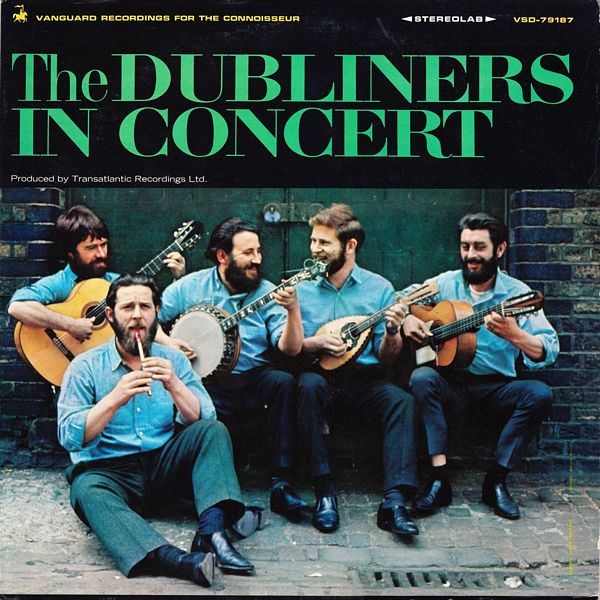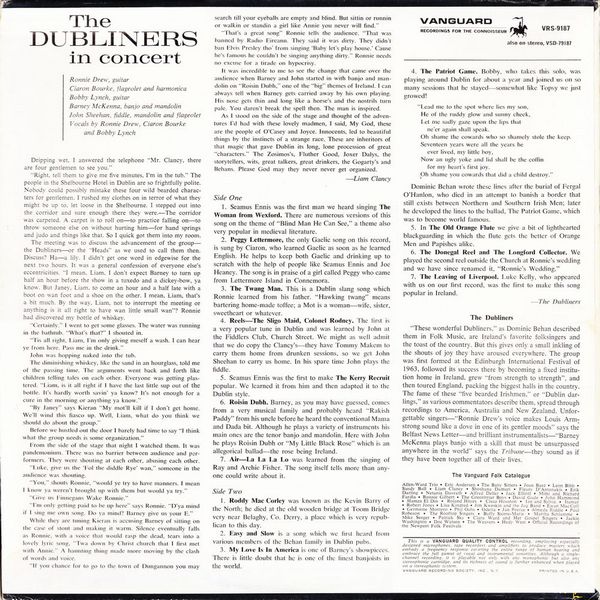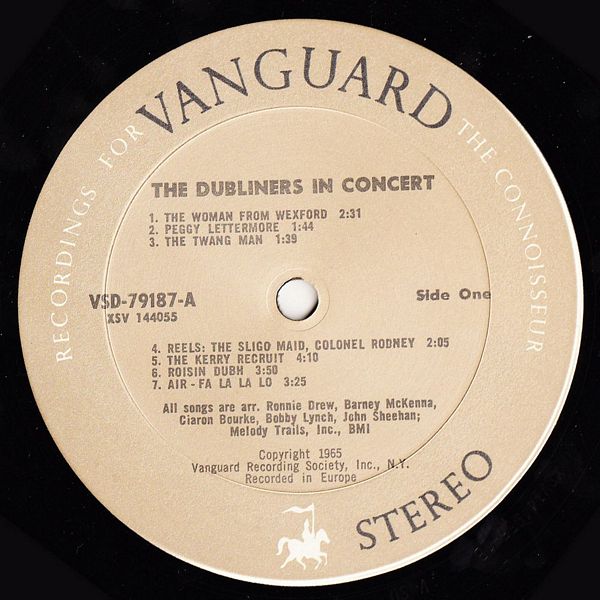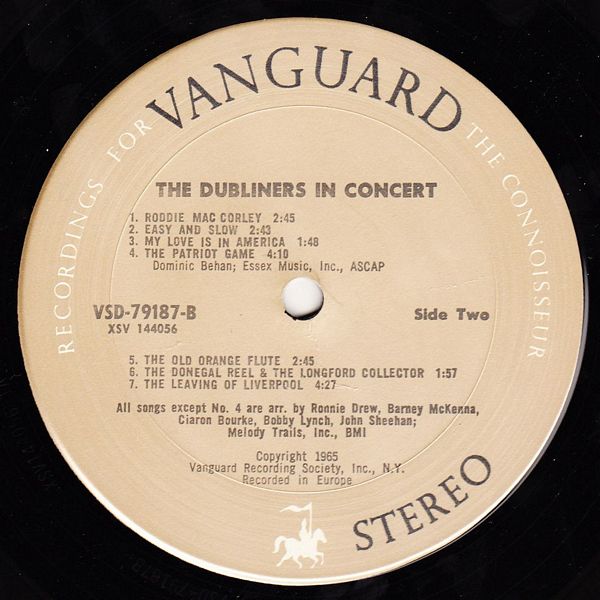

 |


 |
Sleeve Notes
Dripping wet. I answered the telephone "Mr. Clancy, there are four gentlemen to see you."
"Right, tell them to give me five minutes, I'm in the tub." The people in the Shelbourne Hotel in Dublin are so frightfully polite. Nobody could possibly mistake these four wild bearded characters for gentlemen. I rushed my clothes on in terror of what they might be up to. let loose in the Shelbourne. I stepped out into the corridor and sure enough there they were. The corridor was carpeted. A carpet is to roll on — to practice falling on — to throw someone else on without hurting him — for hand springs and judo and things like that. So I quick got them into my room.
The meeting was to discuss the advancement of the group — the Dubliners — or the "Heads" as we used to call them then. Discuss? Ha — a lily. I didn't get one word in edgewise for the next two hours. It was a general confession of everyone else's eccentricities. "I mean. Liam. I don't expect Barney to turn up half an hour before the show in a tuxedo and a dickey-bow, ya know. But Janey, Liam, to come an hour and a half late with a boot on wan foot and a shoe on the other. I mean, Liam, that's a bit much. By the way. Liam, not to interrupt the meeting or anything is it all right to have wan little small wan"? Ronnie had discovered my bottle of whiskey.
"Certainly." I went to get some glasses. The water was running in the bathtub. "What's that?" I shouted in.
"Tis all right. Liam, I'm only giving meself a wash. I can hear ye from here. Pass me in the drink."
John was hopping naked into the tub.
The diminishing whiskey, like the sand in an hourglass, told me of the passing time. The arguments went back and forth like children telling tales on each other. Everyone was getting plastered. "Liam, is it all right if I have the last little sup out of the bottle. It's hardly worth savin' ya know? It's not enough for a cure in the morning or anything ya know."
"By Janey" says Kieran [sic] "My mot'll kill if I don't get home. We'll wind this fiasco up. Well. Liam, what do you think we should do about the group."
Before we hustled out the door I barely had time to say "I think what the group needs is some organization."
From the side of the stage that night I watched them. It was pandemonium. There was no barrier between audience and performers. They were shouting at each other, abusing each other.
"Luke, give us the 'Fol the diddle Rye' wan." someone in the audience was shouting.
"You," shouts Ronnie, "would ye try to have manners. I mean I know ya weren't brought up with them but would ya try."
"Give us 'Finnegans Wake' Ronnie."
"I'm only getting paid to be up here" says Ronnie. "D'ya mind if I sing me own song. Do ya mind? Barney give us your E."
While they are tuning Kieran [sic] is accusing Barney of sitting on the case of stout and making it warm. Silence eventually falls as Ronnie, with a voice that would rasp the dead, tears into a lovely lyric song. "Twa down by Christ church that I first met with Annie." A haunting thing made more by the clash of words and voice.
"If you chance for to go to the town of Dungannon you may search till your eyeballs are empty and blind. But sittin or runnin or walkin or standin a girl like Annie you never will find."
"That's a great song" Ronnie tells the audience. "That was banned by Radio Eireann. They said it was dirty. They didn't ban Elvis Presley tho' from singing 'Baby let's play house.' Cause he's famous he couldn't be singing anything dirty." Ronnie needs no excuse for a tirade on hypocrisy.
It was incredible to me to see the change that came over the audience when Barney and John started in with banjo and mandolin on "Róisín Dubh," one of the "big" themes of Ireland. I can always tell when Barney gets carried away by his own playing. His nose gets thin and long like a horse's and the nostrils turn pale. You daren't break the spell then. The man is inspired.
As I stood on the side of the stage and thought of the adventures I'd had with these lovely madmen, I said, My God, these are the people of O'Casey and Joyce. Innocents, led to beautiful things by the instincts of a strange race. These are inheritors of that magic that gave Dublin its long, lone procession of great "characters." The Zosimos's. Fluther Good, Joxer Dalys, the storytellers, wits, great talkers, great drinkers, the Gogarty's and Behans. Please God may they never never get organized.
The Dubliners
"These wonderful Dubliners," as Dominic Behan described them in Folk Music, are Ireland's favorite folksingers and the toast of the country. But this gives only a small inkling of the shouts of joy they have aroused everywhere. The group was first formed at the Edinburgh International Festival of 1963, followed its success there by becoming a fixed institution home in Ireland, grew "from strength to strength", and then toured England, packing the biggest halls in the country. The fame of these "five bearded Irishmen," or "Dublin darlings," as various commentators describe them, spread through recordings to America, Australia and New Zealand. Unforgettable singers — "Ronnie Drew's voice makes Louis Armstrong sound like a dove in one of its gentler moods" says the Belfast News Letter — and brilliant instrumentalists — "Barney McKenna plays banjo with a skill that must be unsurpassed anywhere in the world" says the Tribune — they sound as if they have been together all of their lives.
Seamus Ennis was the first man we heard singing The Woman from Wexford. There are numerous versions of this song on the theme of "Blind Man He Can See." a theme also very popular in medieval literature.
Peggy Lettermore, the only Gaelic song on this record, is sung by Ciaron. who learned Gaelic as soon as be learned English. He helps to keep both Gaelic and drinking up to scratch with the help of people like Seamus Ennis and Joe Heaney. The song is in praise of a girl called Peggy who came from Lettermore Island in Connemora.
The Twang Man. This is a Dublin slang song which Ronnie learned from his father. "Hawking twang" means bartering home-made toffee: a Mot is a woman — wife, sister, sweetheart or whatever.
Reels — The Sligo Maid. Colonel Rodney. The first is a very popular tune in Dublin and was learned by John at the Fiddlers Club, Church Street. We might as well admit that we do copy the Clancy's — they have Tommy Makem to carry them home from drunken sessions, so we get John Sheehan to carry us home. In his spare time John plays the fiddle.
Seamus Ennis was the first to make The Kerry Recruit popular. We learned it from him and then adapted it to the Dublin style.
Róisín Dubh. Barney, as you may have guessed, comes from a very musical family and probably heard "Rakish Paddy" from his uncle before he heard the conventional Mama and Dada bit. Although he plays a variety of instruments his main ones are the tenor banjo and mandolin. Here with John he plays Róisín Dubh or "My Little Black Rose" which is an allegorical ballad — the rose being Ireland.
Air — La La La Lo was learned from the singing of Ray and Archie Fisher. The song itself tells more than anyone could write about it.
Roddy Mac Corley was known as the Kevin Barry of the North; he died at the old wooden bridge at Toom Bridge very near Belaghy, Co. Derry, a place which is very republican to this day.
Easy and Slow is a song which we first heard from various members of the Behan family in Dublin pubs.
My Love Is In America is one of Barney's showpieces. There is little doubt that he is one of the finest banjoists in the world.
The Patriot Game. Bobby, who takes this solo, was playing around Dublin for about a year and joined us on so many sessions that he stayed — somewhat like Topsy we just growed!
"Lead me to the spot where lies my son,
He of the ruddy glow and sunny cheek,
Let me sadly gaze upon the lips that ne'er again shall speak.
Oh shame the cowards who so shamely stole the keep.
Seventeen years were all the years he ever lived, my little boy,
Now an ugly yoke and lid shall be the coffin for my heart's first joy.
Oh shame you cowards that did a child destroy."
Domnic Behan wrote these lines after the burial of Fergal O'Hanlon, who died in an attempt to banish a border that still exists between Northern and Southern Irish Men; later he developed the lines to the ballad, The Patriot Game, which was to become world famous.
In The Old Orange Flute we give a bit of lighthearted blackguarding in which the flute gets the better of Orange Men and Papishes alike.
The Donegal Reel and The Longford Collector. We played the second reel outside the Church at Ronnie's wedding and we have since renamed it, "Ronnie's Wedding."
The Leaving of Liverpool. Luke Kelly, who appeared with us on our first record, was the first to make this song popular in Ireland.
The Dubliners